GMC Reveals Gender Identity Groups Lobbied to Remove Doctors’ Gender from Public Register
General Medical Council Stopped Accurately Showing Doctors’ Sex Due to Groups British Association of Gender Identity Specialists and GLADD UK
As previously discussed in my article Doctor, No, the UK’s medical regulator the General Medical Council has been allowing doctors to remove or change their ‘gender’ marker on its public register. Several people have put in FOIs with the General Medical Council so that we could discover more information regarding this. In February 2024, a Freedom of Information response informed us of the following:
The GMC has removed the gender of 45 doctors from the public register
The GMC has agreed to represent 54 male doctors as female on the register
The GMC has agreed to represent 24 female doctors as male on the register
The GMC also stated ‘We do not record the sex of doctors, so we do not hold this information’. Only doctors’ gender, which they are treating to mean ‘gender identity’ - which most of the population will not realise.
This provokes the troubling question of how the GMC can possibly guarantee same sex care in the NHS where required, which is something that Baroness Dianne Hayter has thankfully been investigating further for us. Responses received so far from the GMC have amounted to obfuscation and passing responsibility on to local providers, which do not seem to be required to record doctors’ sex either. The GMC effectively seem to be denying all responsibility in this area, which could be seen as a dereliction of duty to patients using the health service.
In March 2024, the General Medical Council was asked ‘If patients cannot know [their doctor’s biological sex], how can they give informed consent?’, to which they responded by stating that they do not have to record this information, referencing mysterious ‘relevant court rulings’ around the information a patient needs to know to provide informed consent to care (as seen below). When later asked which court rulings the GMC was referring to in this response, they simply said ‘from an FOI perspective, this information is not held’. So in a somewhat Kafkaesque manner, certain court rulings have been relied upon to make the decision to no longer be able to guarantee providing patients with same sex care, but patients cannot find out which rulings these are.
In March 2024, we sent further Freedom of Information requests to the General Medical Council. The responses to these were only eventually received in June 2024. These revealed that the organisations who pressured the GMC to allow doctors to change or remove their ‘gender’ on the public register were the Association of LGBTQ+ Doctors and Dentists (GLADD UK) and the British Association of Gender Identity Specialists (BAGIS).
BAGIS clearly have vested interests in obtaining these outcomes. For example, two members of the British Association of Gender Identity Specialists council are males represented as female on the GMC’s public register - Dr Kamilla Kamaruddin and Dr Christine Mimnagh. As Transgender Trend pointed out in April 2024, many prominent leads at BAGIS are also involved with discredited activist organisation the World Professional Association for Transgender Health (WPATH). For example, four members of the BAGIS council are WPATH members: Alison Berner, Leighton Seal, Christine Mimnagh and Kamilla Kamaruddin.
So the fact that these doctors have influenced the UK’s medical regulator to stop including doctors’ sex on the public register and to prevent patients knowing whether they are accessing same sex care is alarming, to say the least. One of these doctors, Dr Kamilla Kamaruddin, stated in an article in the British Journal of General Practice: ‘A lot of my patients were quite conservative [but] after my transition, they even allowed me to perform more intimate examinations that they did not let me do when I was a male GP’. Consultations being described in this way raises questions around whether patients are sometimes being seen as props for doctors’ feelings of ‘gender affirmation’. It could also be seen as compelling patients to endorse the belief that social gender transition actually changes someone’s sex, when they may not actually believe this to be the case.
The other organisation that persuaded the GMC to change their public register, GLADD UK, is the organisation run by gender activist doctors who authored the nation-wide medical schools charter which demands a ban on ‘conversion therapy’ including so-called gender identity, making this a highly unevidenced and unscientific document. It demands that doctors only ‘affirm patients’ gender and sexual identity’. Notice the use of the phrase ‘sexual identity’ rather than sexuality, as according to the GLADD charter’s authors this is something that can be identified in to. As described in my previous article A Gender Critical Analysis of the GLADD Charter, most UK medical schools have now signed this charter without enough scrutiny (currently 80%), which amounts to a widespread and undemocratic ban on questioning patients’ self-proclaimed gender identity, implemented via the back door of the NHS. It also requires doctors to thereby potentially ignore distressed patients’ comorbidities, which could risk the health of vulnerable patients.
Within recent FOI responses, the General Medical Council has admitted that they ‘will not be able to accurately analyse and report on data about the birth sex of registrants’ and ‘are not able to guarantee that the data [they] hold at present reflects birth sex and nor will [they] be able to in the future’. In choosing not to record the sex of doctors in addition to their self-declared ‘gender identity’, the GMC has chosen an activist path. They have allowed data to be corrupted and patients’ informed consent to be overlooked at the behest of gender identity lobbyists.
The General Medical Council even referenced gender activist organisations the Gender Identity Research and Education Society (GIRES) and the LGBT Foundation in documents that they provided justifying their decisions. The GIRES’ document referenced is grimly titled Monitoring Gender Non-conformity (2015), which will likely do nothing to quell many people’s fears that patients’ apparent ‘failure’ to conform to sex stereotypes is simply now being medicalised.
When asked whether patients are able to request same sex care in the NHS, the General Medical Council responded by directing us to the NHS Confederation’s guidance rather than providing an answer of their own. Considering that the first version of this guidance was widely considered to be harmful to the rights of female patients, this is not very reassuring. The Observer’s Sonia Sodha reported that its advice on how to handle patients’ requests for same sex care ‘gets the law badly wrong’ and could ‘lead NHS trusts to unlawfully discriminate against female patients’. Similarly, Naomi Cunningham (a barrister specialising in employment and discrimination law) described in The Critic how the guidance ‘fails women’ and ‘encourages NHS employers to break the law’.
The overall impression given by recent FOIs received by the General Medical Council is that their decisions around same sex requirements have been made on the basis of lobbying by gender identity activists, without taking into consideration the sex-based rights and informed consent of patients. This is something which needs to be robustly challenged and of which the population needs to be made aware.






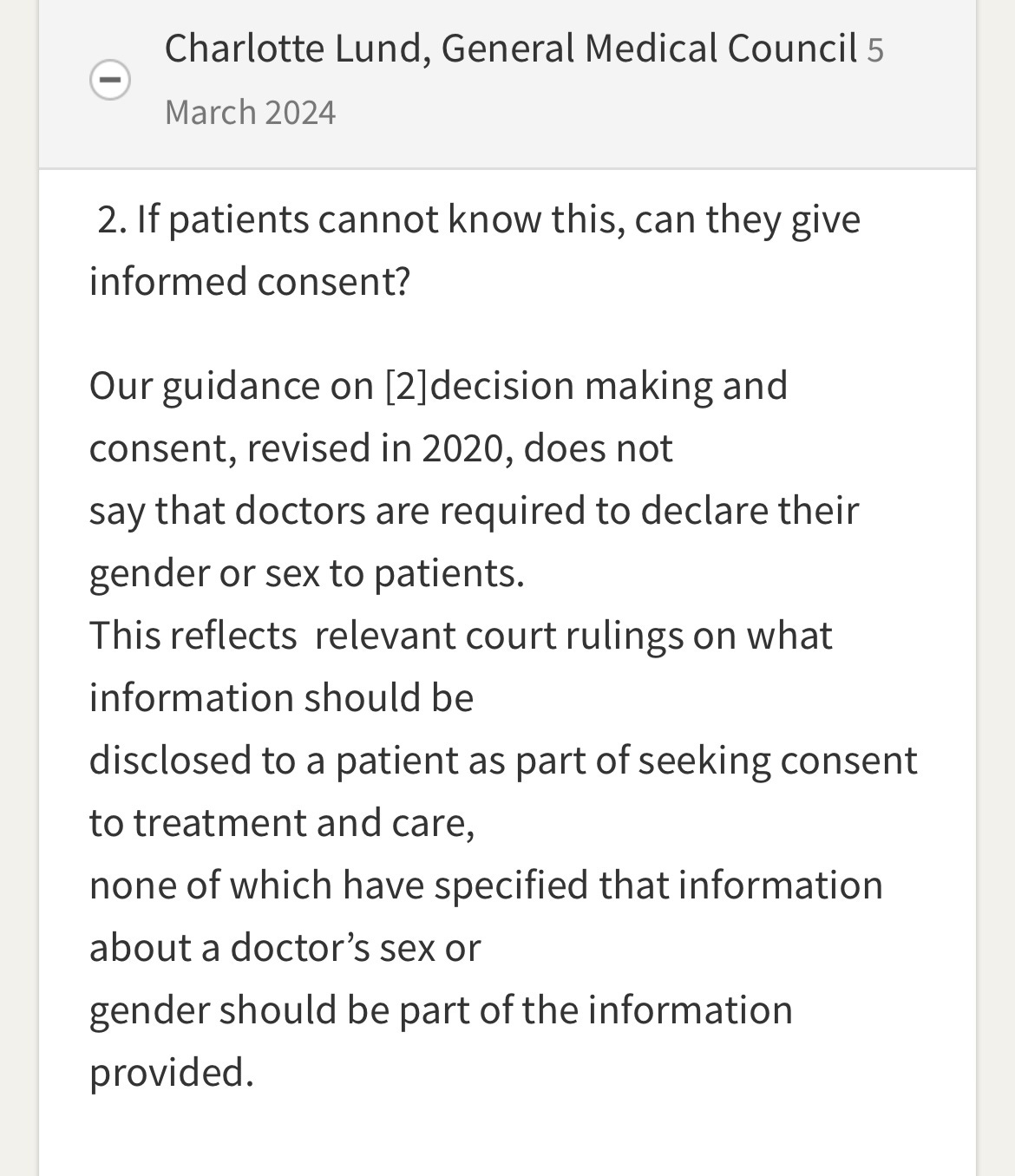
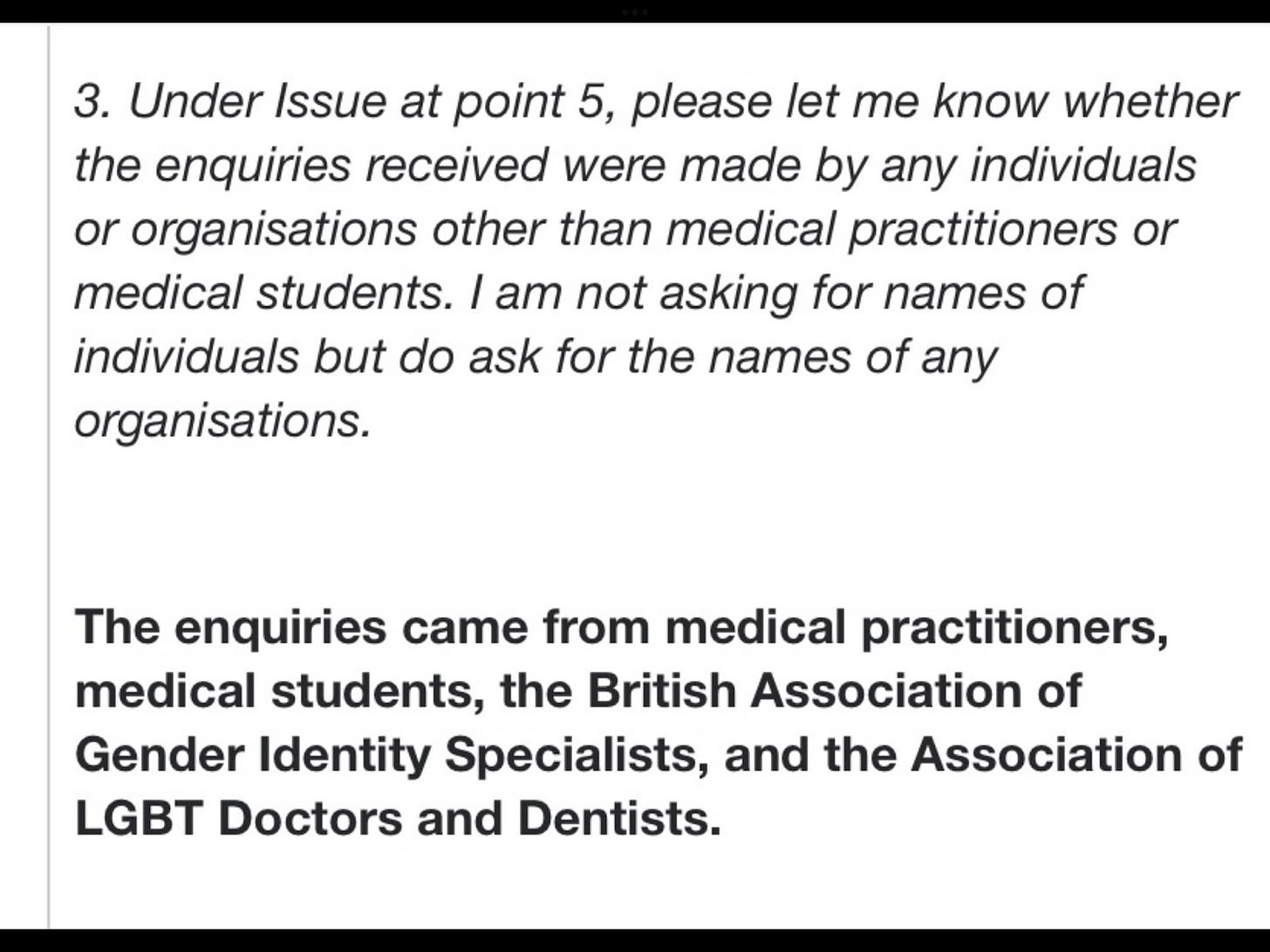
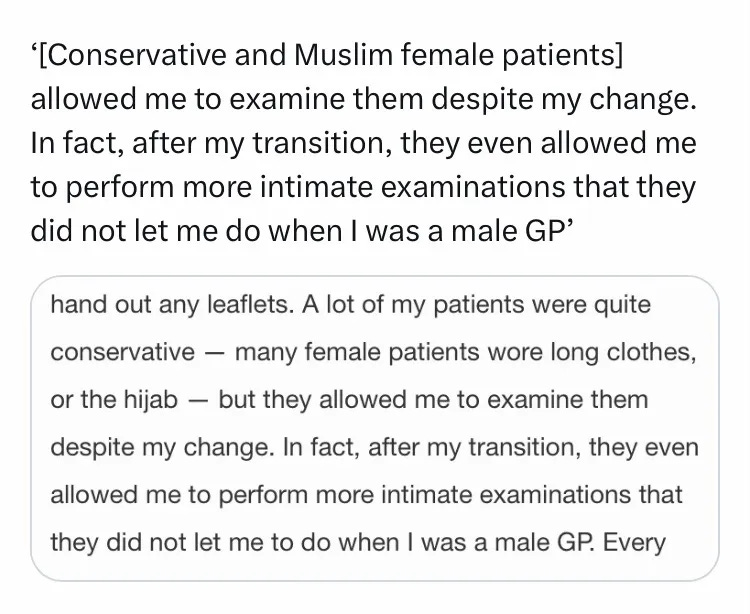
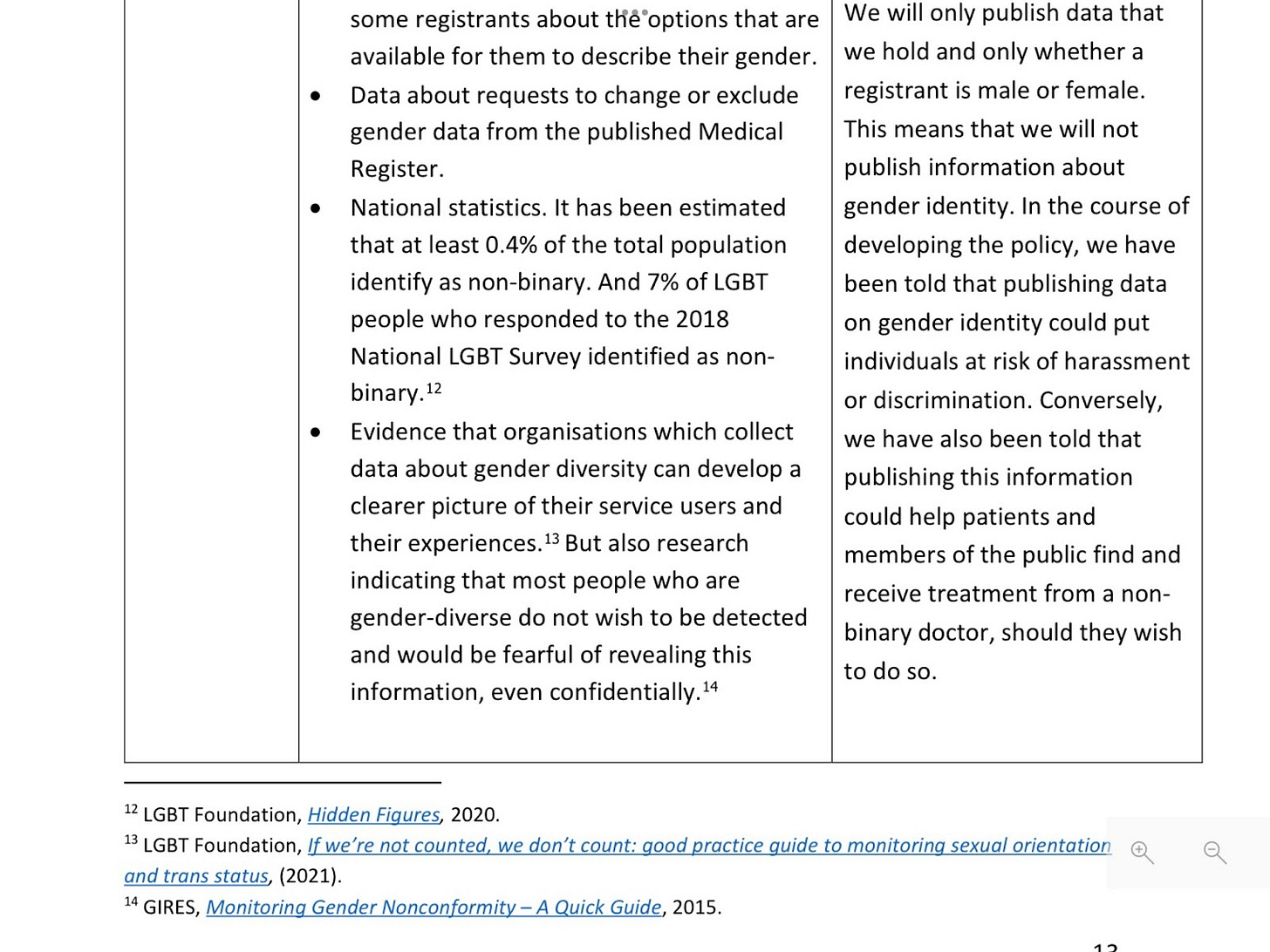
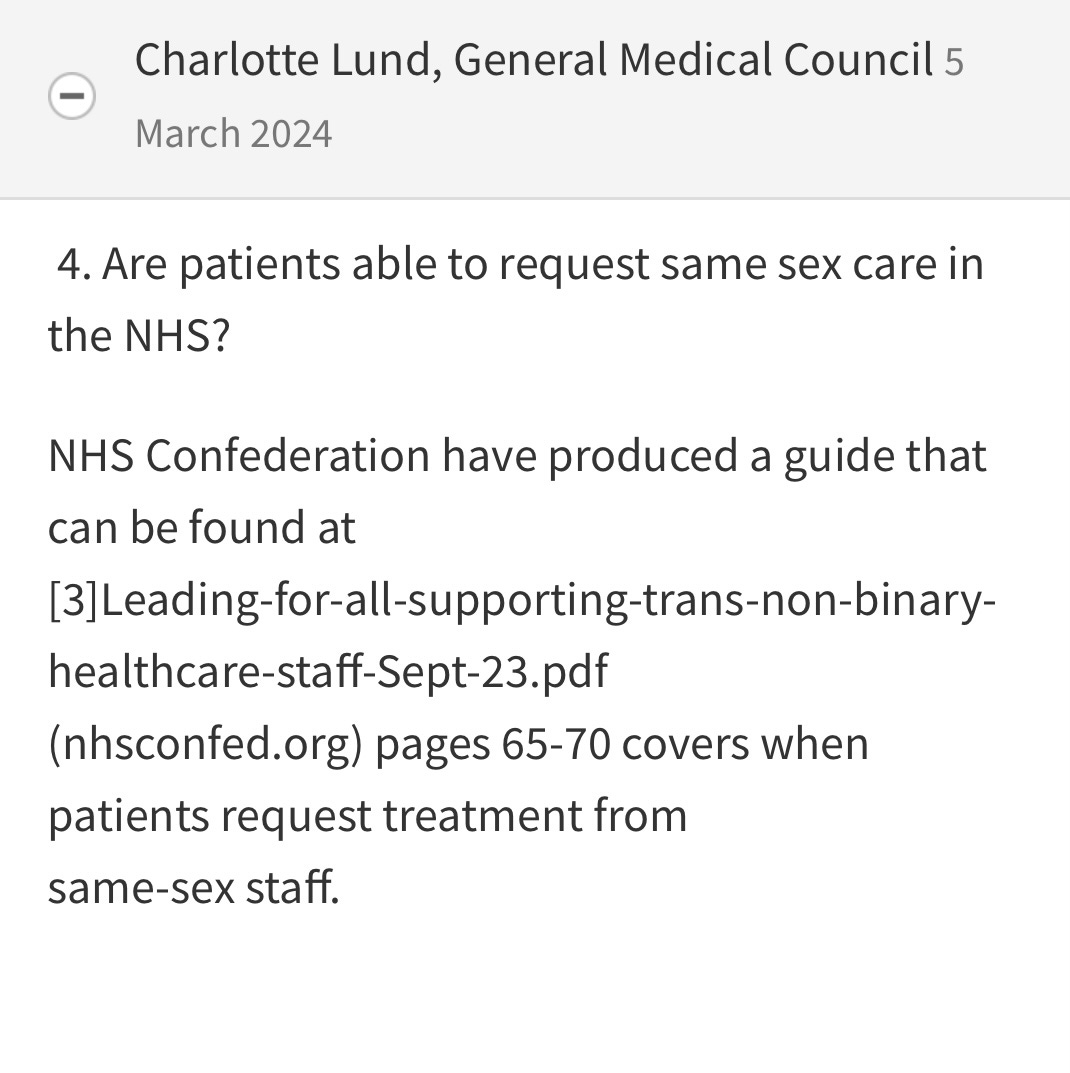
Thank you very much for all your hard work on this important issue. I’m grateful.
The long-term implications of this are significant. Having sneaked self-ID in, it will be extremely difficult to get rid of - a technique trans ideologues have successfully used to move the Overton Window in several areas. Unless the GMC creates rules that actually centre patients and makes false declarations of sex punishable, we are now stuck with a doctors' register that puts practitioners' feelings over the wellbeing of patients.